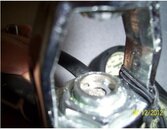I recently bought some regs off ebay . . . I dont want to pay so I would rather find a way to check them myself? I have an ip gauge what should I do?
Check the IP, if you know how to do it. If it is within manufacturer limits,
AND stable, then dive the reg. If not, have them 'serviced' by the LDS.
The notion of having them 'checked' by the LDS before diving may not be practical, because generally a LDS - or any other competent service technician - will tell you in advance: 'We can test IP, we can test cracking pressures. If both are within specifications, we still can't tell you what condition the reg is in. If they aren't within specifications, we can either: 1) attempt to correct it, or b) go ahead and do a full service - disassembly and replacement of parts, followed by adjustment to bring the regulator within pressure specificiations. If a business-competent LDS works on a reg at an hourly rate, the cost of checking it may be equal to the cost of the annual service, in terms of labor.
So, the IP (first stage) is within appropriate limits, and is stable, and the second stage doesn't hiss / bubble when you pressurize it. You have now spent X minutes, to decide that you can dive it. Is there a chance that the regulator will fail completely on the first dive? Yes - you haven't looked inside the first stage at all. Unlikely, but possible. On the other hand, if neither the IP is correct and stable, nor is the cracking pressure where you want it, or should you completely dissassemble, or just adjust settings to see if you can bring the IP to within an appropriate range, and the cracking pressure to within appropiate pressure limits?
I dive a Zeagle DS-V that I bought on eBay, that I used as a pool AND Open Water regulator for 3 years without servicing it, unitl recently - kept saying I would get around to it, but somehow kept putting it off. Worked just fine before service, looked great when I opened it up. worked fine after service.
I also have an Apeks DST, also bought used, that I dove 3-4 times after receiving it - it worked fine, as well. But, I was finally in 'service mode' and decided to do a number of regs that were due (or overdue). The first stage had lots of what appeared to be (saltwater) corrosion, and I was surprised how well it had worked.
Checking the IP is fine,. but it won't tell you everything about the condition of the reg.





